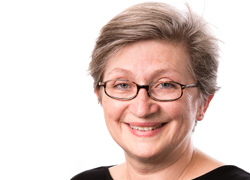27 Apr 2017
3010: Organoid cultivation
This article was first published in The University of Melbourne's 3010 magazine.
Cancer researchers are usually in the business of shrinking tumours. Dr Elizabeth Vincan wants to grow them.
She collects and cultivates organoids – miniature versions of tumours removed from cancer patients – in a lab at the Doherty Institute.
Vincan (BSc(Hons) 1981, PhD 1995) says these tiny cell clusters, the size of a grain of sand, lie at the core of a scientific breakthrough set to revolutionise cancer treatment.
“They are a real game-changer,” she says.
Vincan, head of the Doherty’s Molecular Oncology Laboratory, is part of a group of clinicians and researchers establishing Australia’s first “organoid bank”, a collection of tumour organoids used to test the effectiveness of different anti-cancer drugs.
Alarmingly, many patients don’t respond to a given therapy, but doctors will soon be able to order drug testing on organoids derived from their patients’ own cancer cells. They will then be able to use drugs on patients they already know will work. This makes personalised cancer therapy a reality today.
“A drug pre-screen means that no time is wasted and the patient is treated with the correct drug and dose from the outset,” says Vincan.
“This is just the sort of information a clinician needs — how best to treat their patients.”
The organoid bank will also serve as a repository for large-scale testing of potential drug therapies, avoiding the financial and logistical difficulties of clinical trials.
“Instead of having to sign up a number of patients to do a trial, we can simply thaw out stored tumour organoids and test it,” she says.
The Australian Living Organoid Alliance includes Vincan’s group and doctors and researchers from Royal Melbourne Hospital, the Walter and Eliza Hall Institute and the Victorian Comprehensive Cancer Centre as the Melbourne node. The team has banked about 50 cancers so far. They will spend this year evaluating procedures for their drug screening tests.



